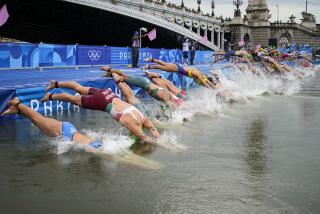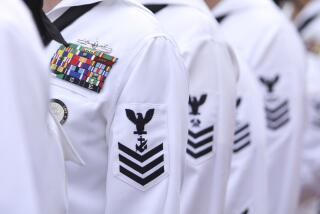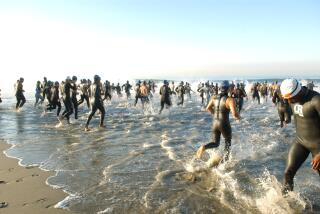Triathletes Take Drug Tests They Initiated
- Share via
SAN DIEGO — The first out-of-competition drug test for triathletes was given Wednesday at San Diego State University.
The test was administered by the Triathlon Federation of the U.S.A. (TRIFED). The twist is, this program was developed by the athletes themselves--the International Federation of Elite Triathletes. (IFET).
“We’re tired of being painted with the same brush as track and field athletes and football players,” said Scott Zagarino, executive director of IFET. “We developed our own program and went to the U.S. Olympic Committee to make sure it was done right.”
Registered letters were sent to 30 triathletes last week, ordering them to appear at the SDSU Student Health Service Wednesday afternoon. If an athlete signed for the letter and failed to appear, he was subject to suspension from triathlon competition for two years--the same penalty as there is for using an illegal substance.
Five athletes didn’t appear because they were out of town and failed to receive their letters. They will not be punished. Test results will not be known for at least three weeks.
“The point is, while track and field, professional football and professional basketball make a lot of noise about drugs and say how difficult an out-of-competition program is, we took the initiative six months ago,” Zagarino said.
Zagarino said IFET began developing the program in November. He said that a budget of $25,000 was allotted for the first year. The first part of the program came April 23 at the America’s Paradis Triathlon in St. Croix, when drug tests were administered to the top five finishers--both male and female--as well as to 10 random finishers from among the top 20 men and women. Wednesday’s testing was the first held not in conjunction with an event.
San Diego was selected as a drug testing site because of the high concentration of triathletes in the area. Another test will be administered in Boulder, Colo. today, and a third at an unannounced site Friday.
“I think it’s really good--they should do it in other sports,” said Paula Newby-Fraser, who is ranked No. 1 in the world by IFET. “I question their choice--I’ve been in three international drug tests already this year. I don’t know why they need to test me again. But I think they’re trying to make the point that they’re serious.”
Paul Ciani of Pacific Palisades received his registered letter Tuesday and had just one day to recruit someone to work for him and plan the drive to San Diego.
“I think it’s good that they’re doing (the testing), but I think they should have allowed a little more leeway,” he said. “Maybe a couple more days notice. It’s not going to make that big of a difference.”
Paul Huddle of Encinitas also likes the idea even though some people say drug testing violates a person’s constitutional rights.
“Maybe, but if you’re making a living at this, it’s your job to make sure your sport is clean. I think this is the only way to do it. I think it’s unconstitutional to take drugs and cheat.”
More to Read
Go beyond the scoreboard
Get the latest on L.A.'s teams in the daily Sports Report newsletter.
You may occasionally receive promotional content from the Los Angeles Times.






